AUGUSTA — Kennebec Valley municipal and business leaders prodded for action, but still the administration stood firm: Gov. Paul LePage wasn’t publicly taking sides in central Maine’s two-company natural gas war.
However, LePage’s in-house attorney, about to become a judge, was working behind the scenes and criticizing two state employees in emails this summer. Tension mounted among top state and administration officials about the handling of the natural gas bidding and public comments about it.
The state employee in charge of the pipeline request for proposal had a “bureaucratic attitude,” Dan Billings, the governor’s chief counsel, wrote to staff members.
Billings also wrote Maine’s attorney general, saying he was “surprised” that Augusta Mayor William Stokes, also the deputy attorney general in charge of that office’s Criminal Division, was asking LePage to get involved personally with the selection of a state contract.
This picture of the office’s inner workings on the natural gas issue comes from emails and letters obtained recently by the Morning Sentinel through a public records request.
It comes at a critical time for the future of natural gas in the region. The Maine Bureau of General Services decided in June to accept a bid by Maine Natural Gas, a Central Maine Power Co.-affiliated company, to build a pipeline from Windsor to serve state facilities in the Augusta area and expand as demand warranted. That bid award was thrown out last week by a state appeals panel, which said the review process was unfair and illegal.
Summit Natural Gas of Maine, the losing bidder, which had appealed the decision, pitched a much larger investment — a $150 million project extending north through a dozen communties, up to Madison, employing around 435 and serving 15,000 customers within three years.
Summit officials say their proposal would hinge on serving anchor manufacturing customers, while also linking to schools, hospitals and some residential areas.
The Maine Natural Gas proposal made a far smaller initial promise: $19.3 million for a project serving only state facilities on both sides of the Kennebec River in Augusta. The firm said it would create about 40 jobs.
Top Kennebec Valley business and municipal leaders coalesced around Summit — or at least their larger project proposal — during the process, including the presidents of the Augusta- and Waterville-based chambers of commerce, Stokes and others. In addition, the Summit project had amassed approval of tax breaks — intended to help finance the project — from most of the communities affected by its proposed pipeline route.
The June 20 decision by the Bureau of General Services hit with a thud among local leaders, who saw the Maine Natural Gas proposal as too narrow in scope and the Summit plan as a rare economic boon that shouldn’t be passed up.
‘I am surprised’
Stokes wrote an email to the governor on June 27, clearly labeled as a letter from him as Augusta’s mayor and not in his role of assistant attorney general in charge of criminal prosecutions, imploring LePage to “intervene in the recent decision making an award to Maine Natural Gas.”
“While this decision may provide short-term savings for the state,” Stokes wrote, “I believe it is short-sighted in the long run and risks missing a once-in-a-lifetime opportunity for the entire central Maine region.”
The next day, Billings wrote Stokes’ boss, Attorney General William Schneider.
“Though it is not directly related to his work for … the AG’s office, I am surprised that someone who works in the AG’s office would suggest — in a letter which is now a public record — that the governor should directly intervene in the award of a state contract,” Billings wrote to Schneider that same day. “As I’m sure you are aware, the state procurement law is intended to prevent exactly what Bill is advocating here.”
Stokes, in a Saturday interview, said he was “taken back” by Billings’ email to Schneider.
“I was not using the term ‘intervene’ in a legal sense. It probably was a poor choice of words, frankly.” he said. “I was thinking more in terms of, ‘Gee, look what’s happened here. You need to be aware of this.’ “
The Billings email wasn’t copied to Stokes, but Schneider’s reply was.
“I’m sure he was speaking figuratively,” Schneider replied to Billings. “We all express ourselves somewhat differently in our various capacities in other venues, don’t we?”
“Yes — and I have been taken to task by you for exactly that,” wrote Billings, a longtime Republican activist who has previously expressed strong views on As Maine Goes, a online conservative forum, and on Facebook.
Schneider responded about an hour later with a smiley face, then wrote, “And so has the mayor.” Billings shot back: “Fair enough.”
Asked for details on this exchange, Brenda Kielty, Schneider’s spokeswoman, said Schneider “had a brief discussion with Bill about the dual roles of (assistant attorney general) and mayor. He did not discuss the potential for any legal breach.”
Stokes said that in a conversation just after Billings’ email, Schneider gave him no indication he was upset with Stokes’ email to LePage.
“I went down to (Schneider’s) office and said, ‘Look, I hope I didn’t put you in a bog here.’ He said, ‘No, no.’ He understood what I meant.” Stokes said. “I’m very sensitive to the fact that I have two hats — at least two hats — and Bill knows that.”
Michael Cianchette, LePage’s acting legal counsel with Billings’ departure, said the administration doesn’t interpret former employees’ emails. State procurement laws outline guidelines for purchasing goods and services, including requests for proposals, with the aim of getting best value for the state.
Stokes called the Billings email “ancient history,” saying there’s been no blowback since then.
“I know Dan Billings, so I’m not surprised,” he said of the email. “To me, it’s a big nothing. I expressed my views as mayor. I made my views known to the governor, assuming he’s read it; and Dan, I guess, had a certain reaction to it.”
‘Bureaucratic attitude’
Alan Henry, the Bureau of General Services’ director of special projects and the point person on the request for proposals bidding process, drew Billings’ ire on July 3. That was the day the Kennebec Journal published a story on Summit’s appeal of the state decision to award the winning bid to Maine Natural Gas.
“If there’s millions of dollars, somebody’s going to appeal,” Henry said in that article. “The bigger-sized contracts tend to get appealed as a matter of principle.”
According to emails obtained through the records request, Henry’s comments appeared to have motivated the governor’s office to do damage control that morning. Billings wrote to governor’s office staff members: “Alan Henry and anyone else at (Department of Administrative and Financial Services) needs to stop talking to the press about this topic. No comment at all.”
Cianchette, then LePage’s deputy counsel, wrote back that he was working on the issue, that he and LePage policy adviser Jonathan Nass were already there and “had that conversation.”
Billings then criticized Henry directly in an email that morning, writing that “his comments make it clear he believes the appeal is just what bidders do when they lose. Not an appropriate public suggestion, or attitude, for a state official. The bureaucratic attitude on display.”
LePage Press Secretary Adrienne Bennett chimed in, saying the day before she had sent an email “clearly stating no comment was to be made. It went to several people” at the Department of Administrative & Financial Services.
Competing project visions?
In interviews Friday, Cianchette and Ken Fletcher, the governor’s energy director, declined to comment on any difference of opinions among state officials about the scope of the natural gas proposals for central Maine. However, Fletcher has said the state government and its properties in the Augusta area would be a good anchor for a regional project.
In an email June 27 to the governor’s office staff, Henry seems to eschew the regional project concept.
“My job focus is on state facilities and saving money to operate them. Maine Natural Gas is ready and Summit isn’t yet,” he wrote.
The documents show the governor received pointed letters of support for Summit from Stokes and others, including Gardiner City Manager Scott Morelli; while testimony from business professionals, many in northern Kennebec County, also trickled in.
“I fear for the future of this fine community if Waterville is on the outside looking in when natural gas is delivered to every other urban area along the (Interstate) 95 corridor,” John Dalton, president and CEO of Inland Hospital in Waterville, wrote in a July letter to LePage. Dalton said natural gas could save the hospital $300,000 per year.
Ray McMullin, plant manager at Huhtamaki, a disposable-packaging manufacturer in Waterville, wrote that in anticipation of natural gas service, the plant “bid on new business more competitively,” adding “30 new jobs in the past year.”
Fletcher, in an interview, said the governor’s team had to drown out the noise coming from local officials about the gas project decision to preserve the integrity of the state contract.
“We understood what the process was. This isn’t a political process,” Fletcher said. “As far as those letters and influence coming in, we did everything we possibly could to make sure there was a strong firewall that in no way jumps over to that part of the process.”
The governor’s role
There was only one possible breakdown from outside the office earlier this summer.
Kim Lindlof, president of the Waterville-based Mid-Maine Chamber of Commerce, sent an email to Summit officials and others that was obtained by the Kennebec Journal for an earlier story. Lindlof, who was LePage’s campaign finance director during his 2010 gubernatorial campaign, said in the email that she had received a message from LePage “indicating that he won’t sign on to anything that doesn’t hit the valley up to Madison.”
Such communication between LePage and Lindlof, however, does not appear in the recent Kennebec Journal records request.
Fletcher said LePage didn’t have any formal role in the process, other than his normal influence as governor.
Emails show the administration took a cautious approach, from discussing the governor’s opinions, to equity in meetings between the governor and both Summit and Maine Natural Gas.
For example, on June 25, Billings emailed Fletcher, asking whether he knew of LePage’s reaction to the initial state decision on June 20 to give Maine Natural Gas the contract. Fletcher replied by saying he would tell Billings in person.
Micki Mullen, LePage’s executive assistant, ran one of the governor’s scheduled meetings with Maine Natural Gas officials in July by Billings before holding it, saying “it seems even more exacerbating for him to meet with one and not the other,” and adding that staff members had handled an earlier meeting with Summit officials.
Billings replied by saying the meeting was “fine,” and LePage “would have met with Summit if his schedule had permitted.”
An email string shows that Summit was scheduled to meet with LePage in early June, and Billings said in an email to Fletcher that he wanted to know what the meeting would be about. “The possibility of an appeal remains,” Billings wrote, and “such discussion would be inappropriate.”
“I could imagine claims being that (the state) decision on the (request for proposals) could impact their plans,” Billings wrote. “If there is any possibility that something like that is going to happen, we need to know about it ahead of time.”
Fletcher, in an interview, said meetings with Summit and Maine Natural Gas didn’t stray into this territory; they were instead on the subject of enticing potential customers to switch to natural gas.
“This is really a customer-driven mission, so the conversations we had even before this whole issue came up, back over a year ago, is the whole point that one of the keys to the pipeline was reaching out to potential customers,” Fletcher said.
On the scope of the two sides’ proposals’ promised investments to serve those customers, LePage’s energy director said that although he wasn’t speaking for his boss, he noticed the stark difference.
“Obviously, or you’d think it was pretty obvious — there are two levels,” he said. “It didn’t appear each had the same view, in my opinion.”
Michael Shepherd — 621-5632
mshepherd@mainetoday.com
Send questions/comments to the editors.

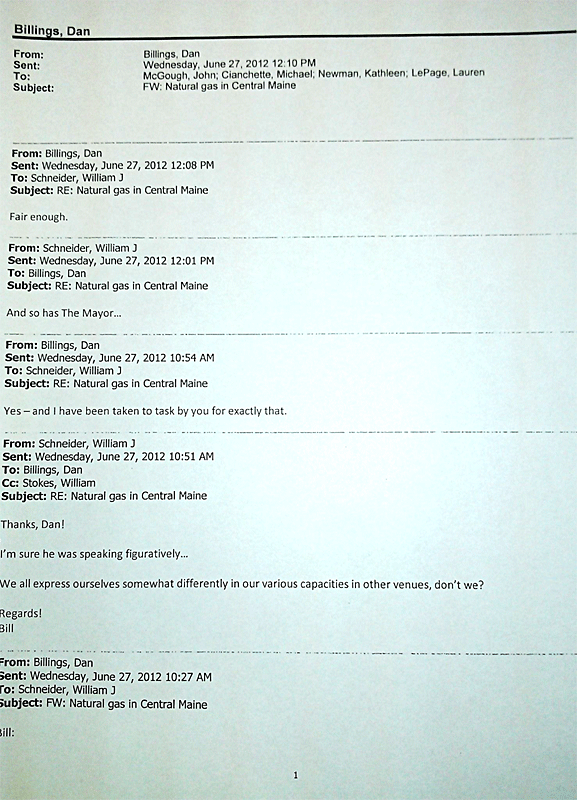
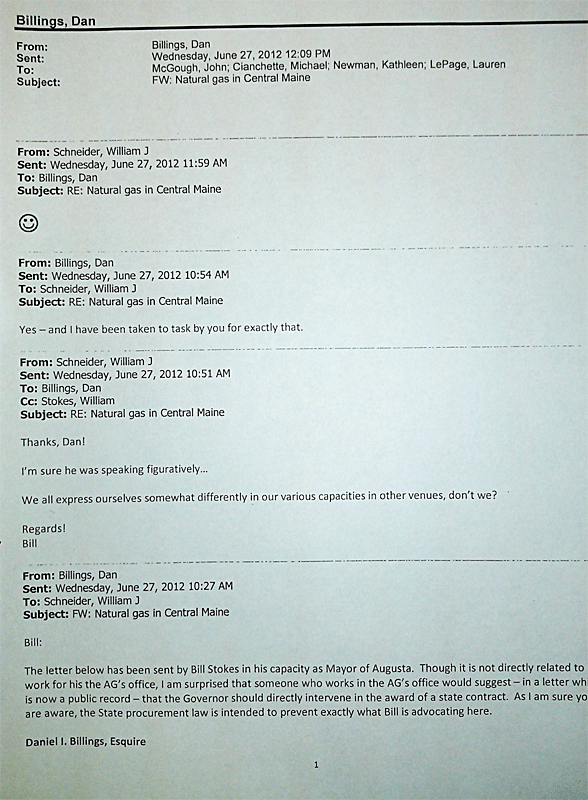
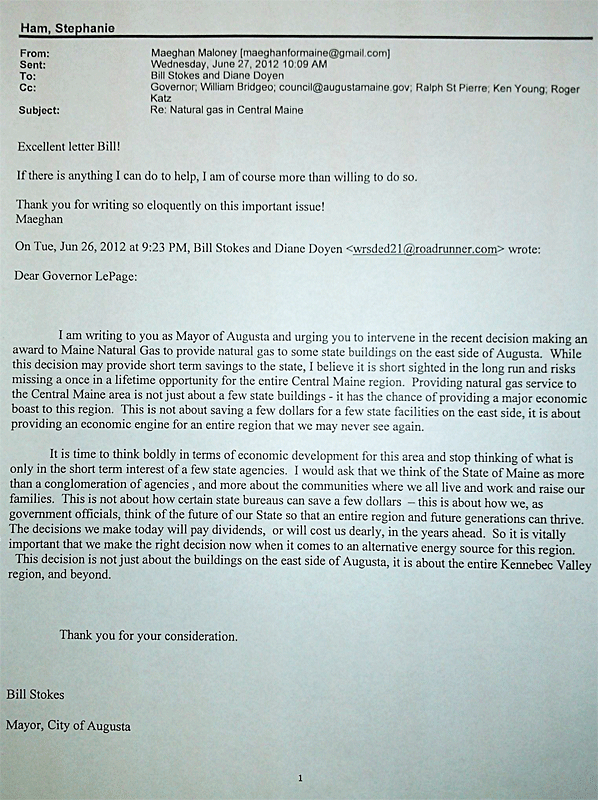
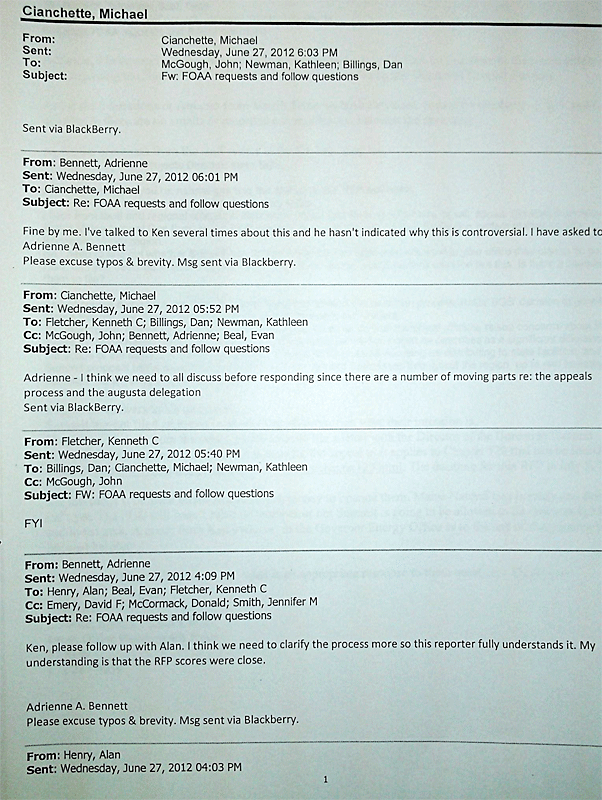
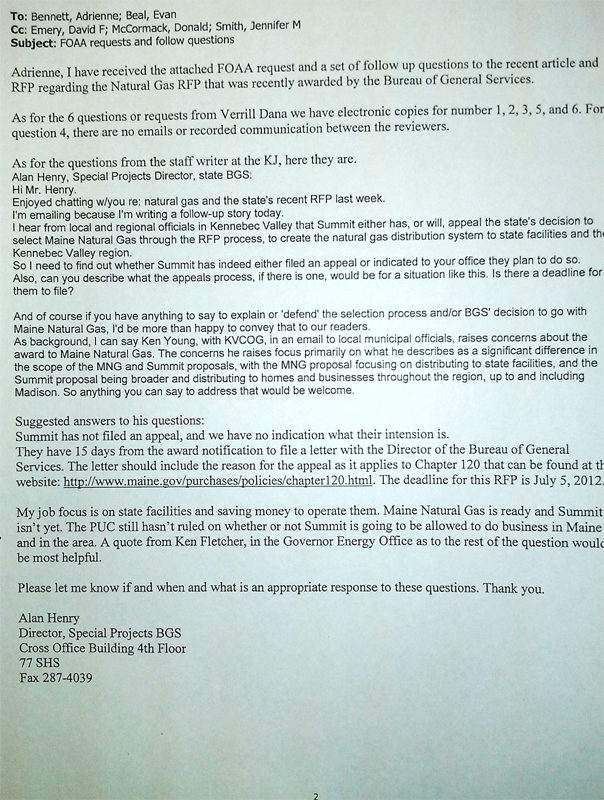
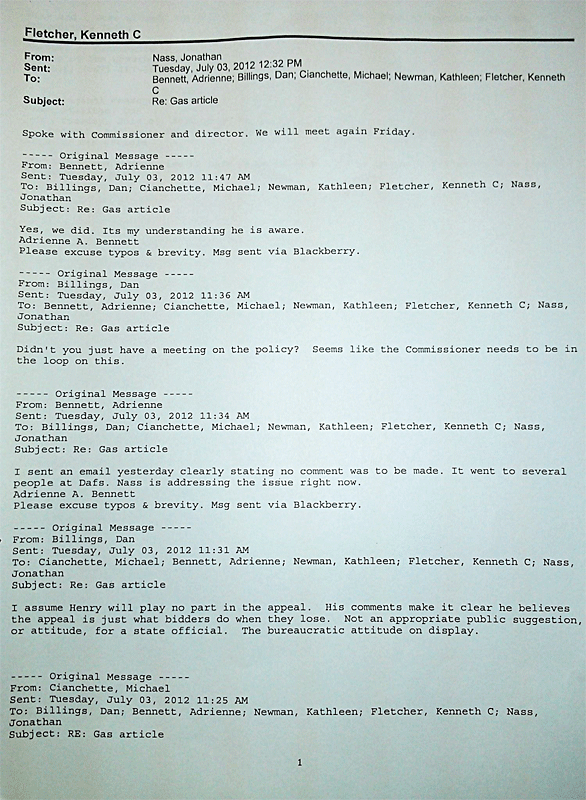


Comments are no longer available on this story